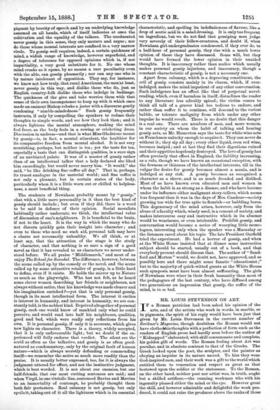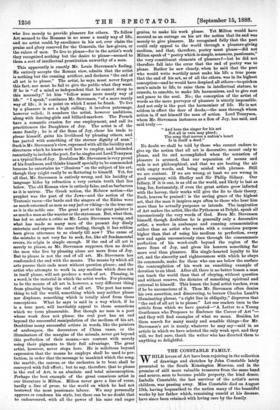MR. LOUIS STEVENSON ON ART.
"1-11 a Roman patrician had been asked his opinion of the .I- arts, and of the artists who work in words, in marble, or in pigments, the spirit of his reply would have been just that given. by Mr. Louis Stevenson in the current number of Scribner's Magazine, though doubtless the Roman would not have clothedthis thoughts with a perfection of form such as the readers of English prose had hardly seen before the author of " Kidnapped " elaborated, with skill consummate and complete, his golden gift of words. The Roman feeling about Art was peculiar, and in absolute contrast to that of the Greeks. The Greek looked upon the poet, the sculptor, and the painter as obeying an impulse in its nature sacred. To him they were God-inspired men, and their work was a gift to the world which entitled them to veneration and respect as great as that bestowed upon the soldier or the statesman. To the Roman. on the other hand, neither poet nor artist wan, in truth, aught but a skilled. artificer,—the cunning workman who with his ingenuity pleased either the mind or the eye. However great the skill, and however admirable and delightful the work pro- duced, it could not raise the producer above the ranks of those
who live merely to provide pleasure for others. To follow Art seemed to the Romans in no sense a manly way of life, and no artist could, by excellence in his art, ever claim the praise and glory reserved for the Generals, the law-givers, or the rulers of men. To live to please—for in the artist's work they recognised nothing but the desire to please—seemed to them a sort of intellectual prostitution unworthy of a man.
This apparently is exactly Mr. Louis Stevenson's feeling. He entirely accepts the Roman view, admits that the artist is nothing but the cunning artificer, and declares "the end of all art is to please." The artist, he says, must never forget this fact, nor must he fail to give the public what they want. If he is " of a mind so independent that he cannot stoop to this necessity," let him "follow some more manly way of life." " I speak," continues Mr. Stevenson, " of a more manly way of life ; it is a point on which I must be frank. To live by a pleasure is not a high calling ; it involves patronage, however veiled; it numbers the artist, however ambitious, along with dancing-girls and billiard-markers. The French have a romantic evasion for one employment, and call its practitioners the Daughters of Joy. The artist is of the same family ; he is of the Sons of Joy, chose his trade to please himself, gains his livelihood by pleasing others, and has parted with something of the sterner dignity of man." Such is Mr. Stevenson's view, expressed with all the lucidity and directness which he knows well how to employ, and intended essentially to include the poet, for he singles out Lord Tennyson as a typical Son of Joy. Doubtless Mr. Stevenson is very proud of his frankness, and thinks himself specially to be commended because he entertains no "illusions" on the subject of his art, though they might easily be so flattering to himself. Yet, for all that, Mr. Stevenson is entirely wrong, and his lucidity of language hides by refraction a very certain truth that lies below. The old Roman view is entirely false, and as barbarous as it is untrue. The Greek notion, the Hebrew notion—the prophet was the poet of the Jews—and the notion of the Teutonic races—the bards and the singers of the Eddas were as much esteemed as men as any jarl or viking—is the true one as it is the noble one. The great poet or the great painter is as much a man as the warrior or the statesman. But, what then, has led so astute a critic as Mr. Louis Stevenson wrong, and what has made so many men of the present day dimly entertain and express the same feeling, though it has seldom been given utterance to so clearly till now ? The cause of the mistake is not very far to seek, for, like all fundamental errors, its origin is simple enough. If the end of all art is merely to please, as Mr. Stevenson supposes, then no doubt the men who live by pleasing alone are mere Sons of Joy. But to please is not the end of all art. Mr. Stevenson has confounded the end with the means. The means by which all arts pursue their ends must without question please ; and the artist who attempts to work in any medium which does not in itself please, will not produce a work of art. Pleasing, in a word, is the material in which the artist works. For pleasing to be the means of all art is, however, a very different thing from pleasing being the end of all art. The poet has some- thing to tell the world, something which may neither please nor displease, something which is totally aloof from these conceptions. What he says is said in a way which, if he is a true poet, will inevitably appeal to those sensations which we term pleasurable. But though no man is a poet whose work does not please, the real poet has an end beyond the successful manipulation of the medium of his art. Doubtless many successful artists in words, like the painters of arabesques, the decorators of China vases, or the illuminators of the margins of the missals, never get beyond this perfection of their means,—are content with merely using their pigments to their full advantage. The great artist, however, never stops here. He is solicitous beyond expression that the means he employs shall be used to per- fection, in order that the message to mankind which the song, the marble, the canvas, or the orchestra is to bear, shall be conveyed with full effect ; but to say, therefore, that to please is the end of Art, is an absolute and total misconception. Perhaps the best example of the great conscious artist in our literature is Milton. Milton never gave a line of verse, hardly a line of prose, to the world on which he had not bestowed the most passionate labour. We may personally approve or condemn his style, but there can be no doubt that he endeavoured, with all the power of his sane and eager
genius, to make his work please. Yet Milton would have scouted as an outrage on his art the notion that its end was merely to give pleasure. He recognised fully that the poet could only appeal to the world through a pleasure-giving medium, and that, therefore, poetry must please—did not Milton speak of " poetry which is simple, sensuous, passionate," the very constituent elements of pleasure ?—but he did not therefore fall into the error that the end of poetry was to please. Rather he saw clearly, when he said that the poet who would write worthily must make his life a true poem that the end of his art, as of all the others, was in its highest conception—and he would have despised all others—to quicken men's minds to life, to raise them in intellectual stature, to console, to ennoble, to make life harmonious, and to give rest and peace to the soul. No ; the conception of the artist of words as the mere purveyor of pleasure is utterly impossible.
And not only is the poet the harmoniser of life. He is not seldom in effect the doer of deeds,—the man through whom action is, if not himself the man of action. Lord Tennyson, whom Mr. Stevenson instances as a Son of Joy, has said, and said truly :- " And here the singer for his art Not all in vain may plead ; The song that nerves a nation's heart Is in itself a deed."
No doubt we shall be told by those who cannot endure to give up the notion that all art is decorative, meant only to please, and its end accomplished when the sensation of pleasure is aroused, that our separation of means and ends is not philosophical, and that we are beating the air with empty words, and being misled with phrases. Still we are content. If we are wrong, at least we are wrong in good company, with Shelley and Sir Philip Sidney. Our fallacy, if it is one, is as old as the world, and likely to last as long, for, fortunately, if even the great artists grow infected with the heresy, their works will give the lie to their theory. Such, heaven be praised ! is the saving grace of the highest art, that the man it inspires says often to those who hear him more than he actually purposes or intends. The inspiration of Art makes the artist, like the Pythoness at Delphi, speak all unconsciously the very words of God. Even Mr. Stevenson himself, though doubtless he is generally only a decorative artist, a worker in arabesque and cunning ornamentation rather than an artist who works with a conscious purpose
higher than that of using his medium to perfection, every now and again unconsciously rises through the consummate
perfection of his word-craft beyond the region of the mere Sons of Joy, and gives his hearers something far more real than pleasure. His single-hearted loyalty to his art, and the sincerity and righteousness with which he obeys its commands, make for those who can see below the surface the contemplation of his work an ennobling example of devotion to an ideal. After all, there is no better lesson a man can teach the world than that of obeying, without question and without reserve, the dictates of something spiritual and external to himself. This lesson the loyal artist teaches, even if he be unconscious of it. Thus Mr. Stevenson often denies his own assertion, and discovering, to borrow Charles Lamb's illuminating phrase, " a right line in obliquity," disproves that " the end of all art is to please." Let our readers turn to the article from which we have quoted—" A Letter to a Young Gentleman who Proposes to Embrace the Career of Art "- and they will find examples of what we mean. Besides, let them search for many manly and sensible things—for Mr. Stevenson's art is manly, whatever he may say—said in an article in which we have selected the only weak spot, and they will, we feel sure, thank the writer who has directed them to anything so delightful.



































 Previous page
Previous page